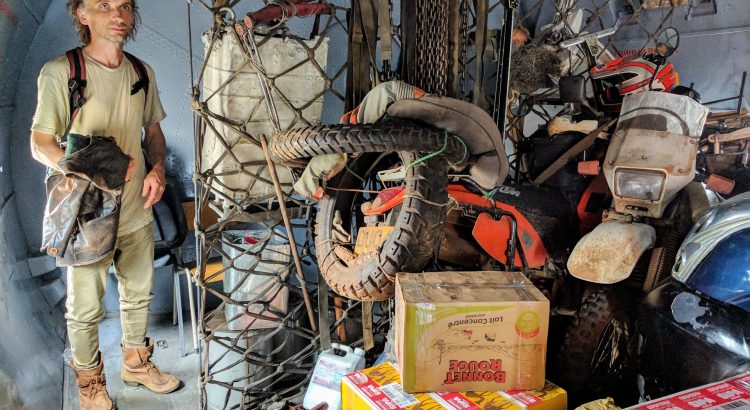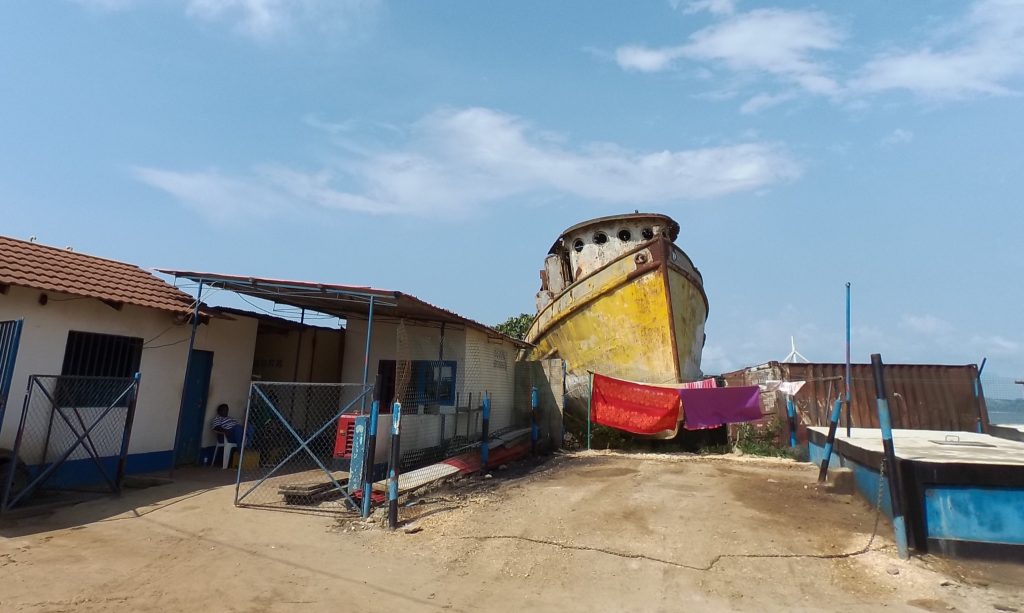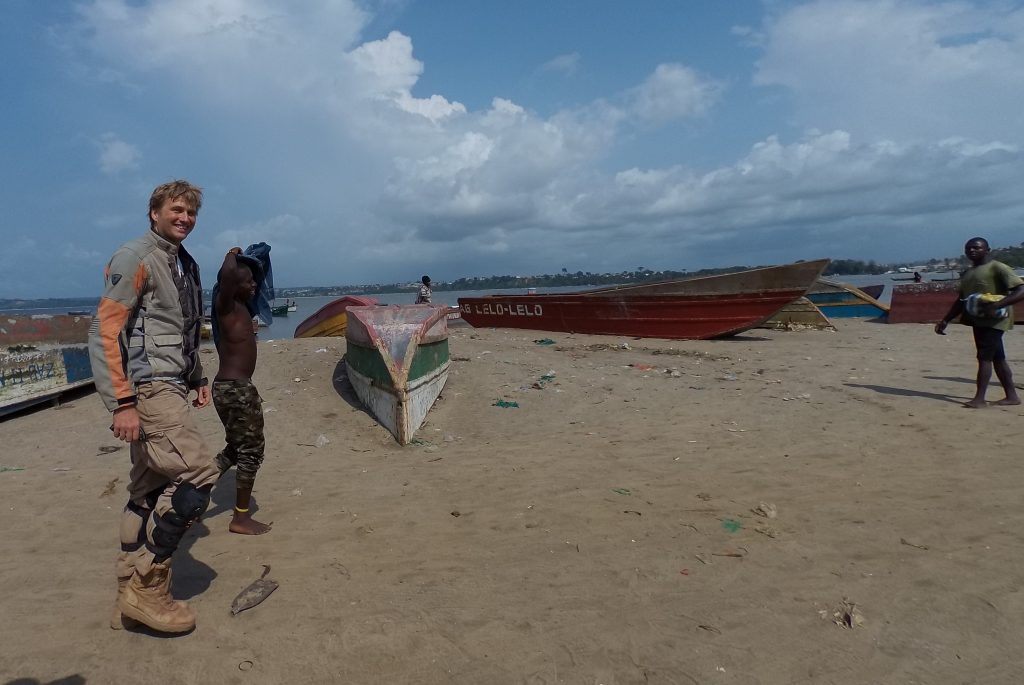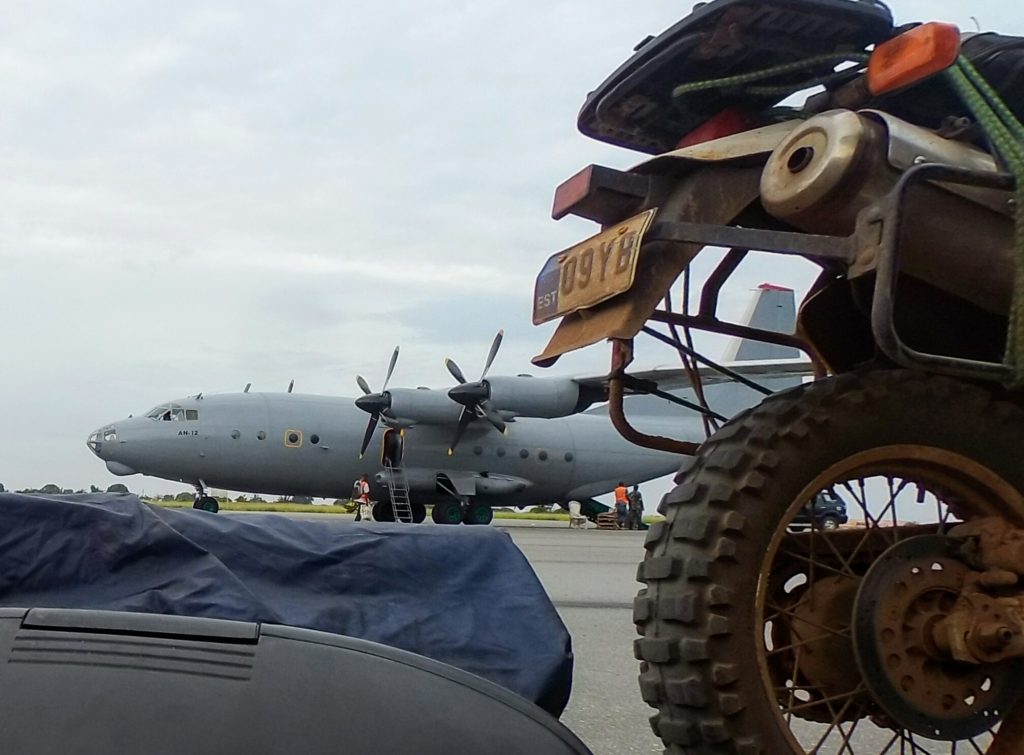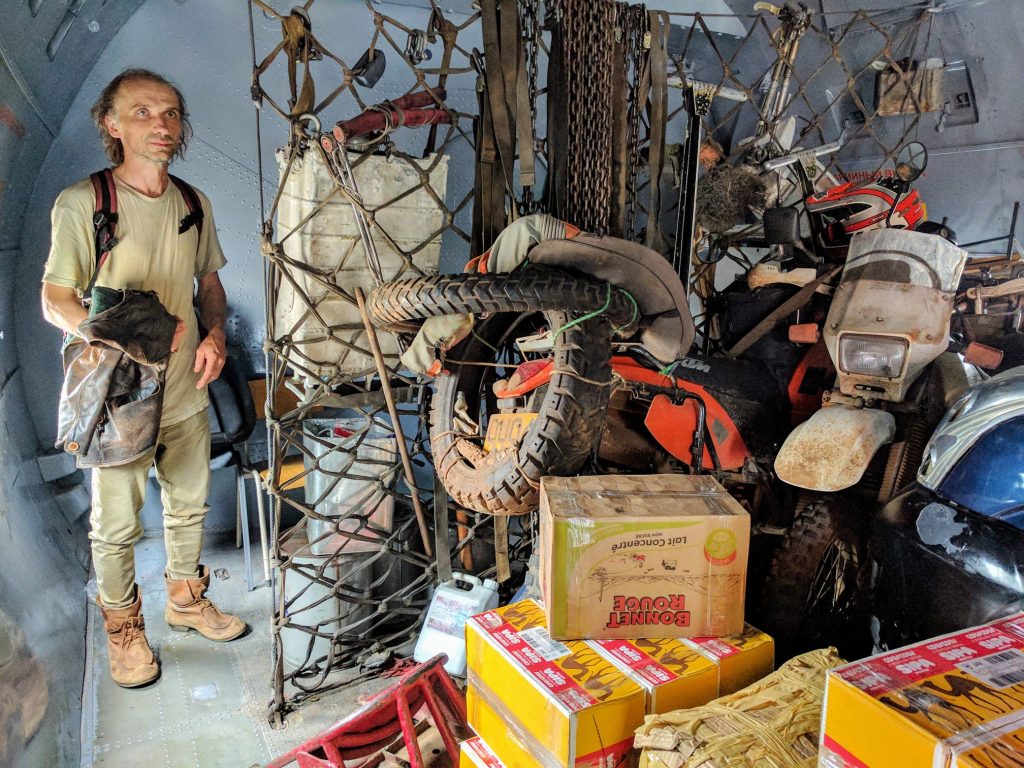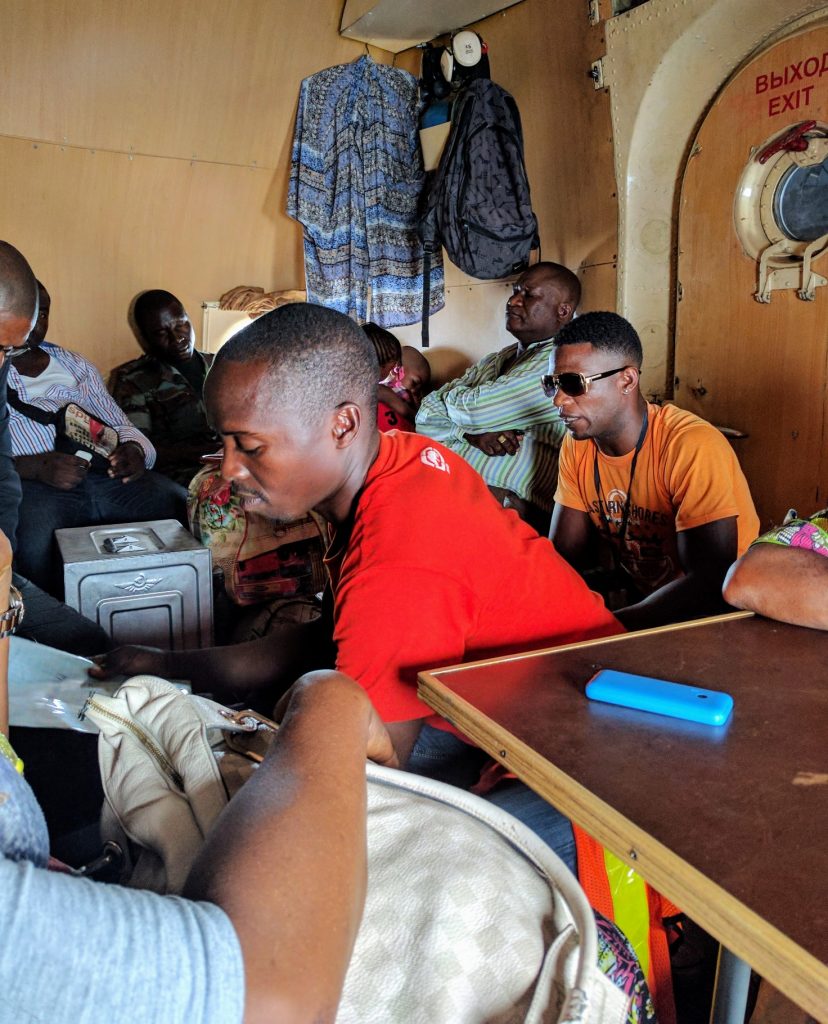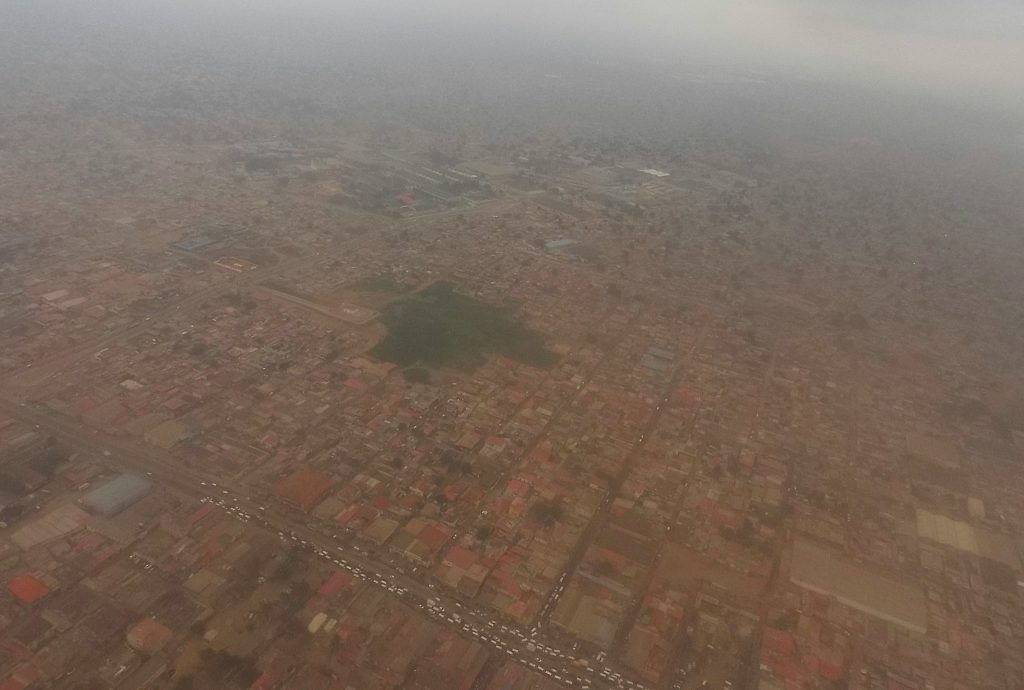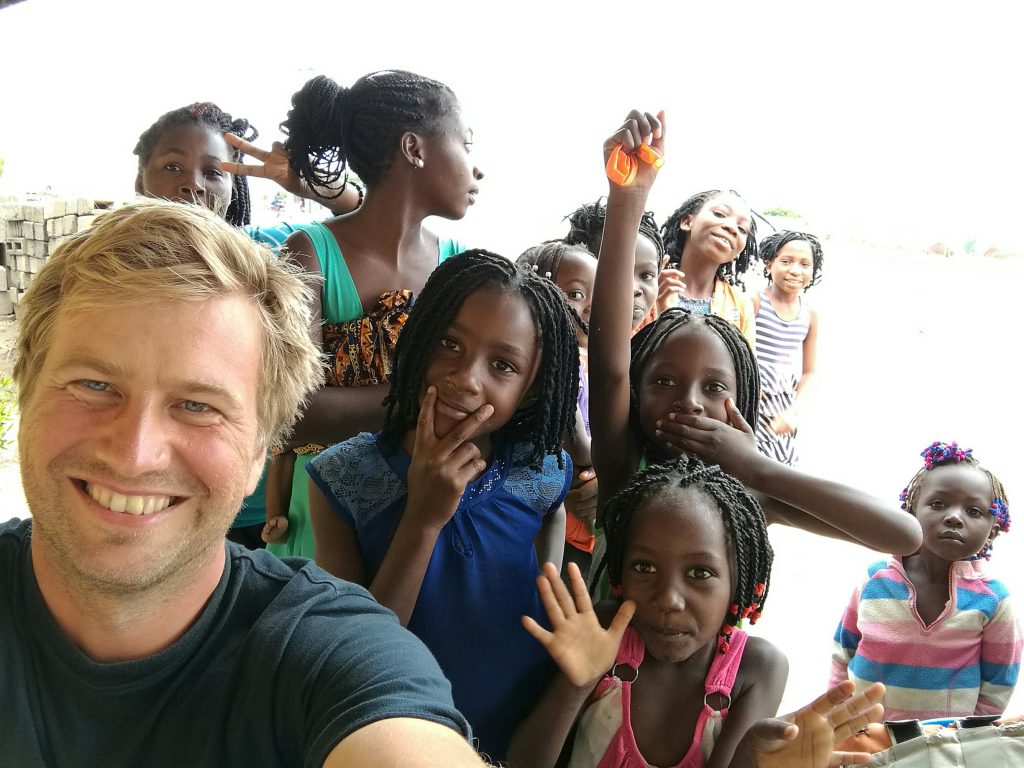The ramp in front of me is steep. Marat from Tatarstan already calls davai, davai. So I go up fast enough to warrant a little jump off the end of the ramp landing into an Antonov 12 military cargo plane. It is a four-prop classic, built some time between ’59 and ’73. It is also our ride out of the Angolan enclave of Cabinda, courtesy of Angolan military and 250 USD.
Sitting in Point-Noire and reading every report we could find on the internet we only get confirmations that there is no way of getting a DRC visa in Brazzaville, but there were mentions of 3 ways of getting from Cabinda to mainland Angola around the 30km of DRC coastline and the Congo river. We decided the Cabinda routes give us the best chances to get out to Namibia by the middle of January. The border crossing from Congo to the Angolan enclave was pretty sensible by the African standards. I was being cursed on by the comandant because I (Europeans) set them up with a computer system that then doesn’t work and is generally no good. The Angolan side feels more orderly, guess it is the roads and visibly more army folks. Even the police looks more serious. The oil platforms that started from Equatorial Guinea, Gabon and Congo contirnue in Cabinda and will follow to DRC and northern Angola. Oil is the income in this part of Africa. It buys the Range Rovers, air conditioned villas and also builds some roads to the varying level in each country based on the attitude of the governing de facto dictator. Cabinda used to be known as the Portuguese Congo, the center of the Cabinda city reminds of Portugal quite a bit. The locals specifically don’t want to be called Angolans, rather Cabindese. During the Angolan civil war between ’75 and ’02 there was a faction fighting for independent Cabinda, but the real players of the war USSR, US and South Africa weren’t gonna let these dudes get away with all the oil to be extracted from the seabed.
Our Angolan transit visa runs out in 5 days, would be good to get to the mainland while the visa is still valid. An expired visa won’t stop the travels once we’re on the mainand. We arrive at the official Cabinda port first and as we suspected they know nothing of a ferry to Soyo, instead they send us to a fishing port.
We couldn’t find it, instead we landed in a fish market and next to it was a field of trash and some pirogues in the mud left behind by the tide which had gone out. We’re directed around the corner, where we find a bit bigger wooden fishing boats. Stuck in the mud. The port means basically a parking lot. The chata‘s come in with high tide, wait until the tide goes out, offload the pesce and then go out again when the tide is high.
Yet here is a police post. We attempt to ignore them and go directly to one of the larger boats, who have already loaded 700kg of cargo into his chata. But we can’t even start before we’re surrounded by 9 uniformed police folks, who said that their commandante had called and they’re expecting two white guys and have gotten orders not to let them leave on the chata. We protest, but to no avail. Commandante’s orders. The police explains that they have already reserved places on the afternoon flight for us, but they hadn’t quite considered the motorbikes. Worry thee not, they say – there is a military airplane that goes between Luanda often. Sounds like a very similar turn of events for us as the forum post I read from March.
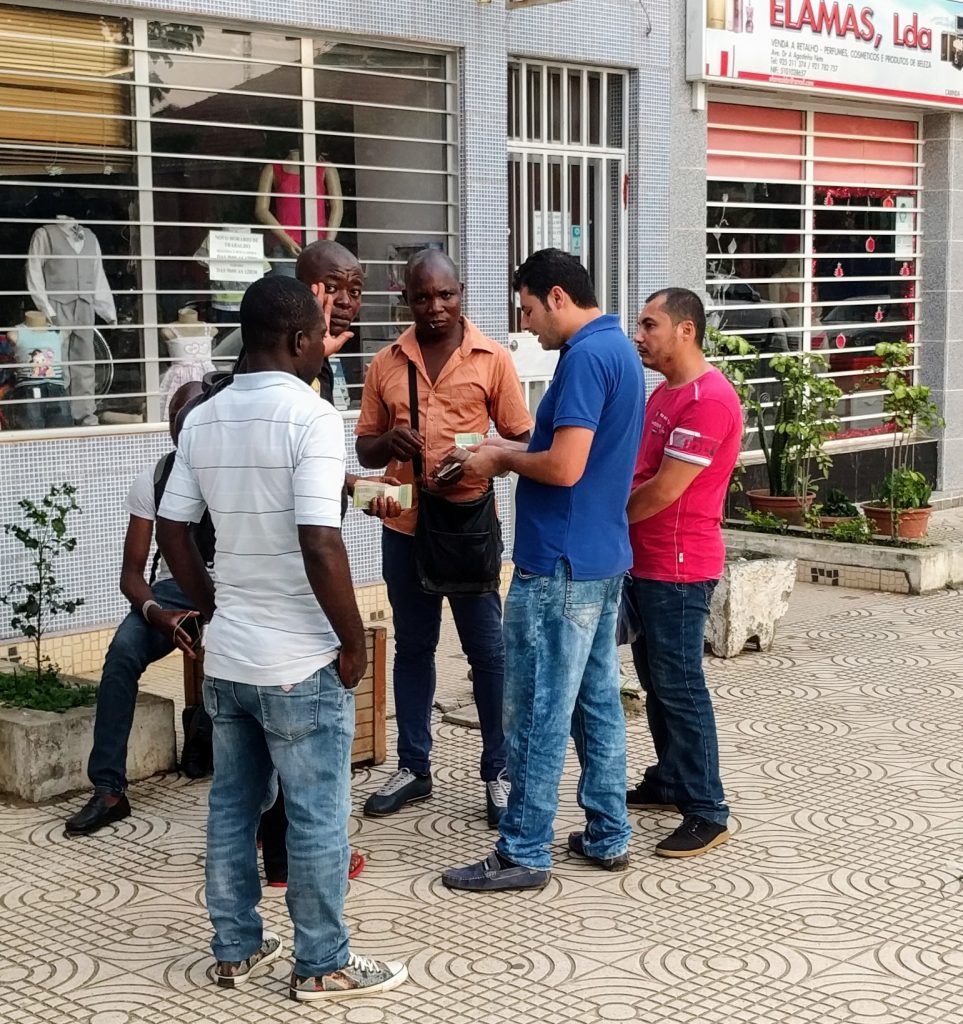
At the military base we find a half open gate guarded by two bored soldiers. We explain our opportunity in perfect portuguese and they send me to talk to the boss. They refer to a “boss” or “commandante” and to aid the interlinguistic gap, it always comes with a hand sign, touching the left shoulder and the right shoulder. Universal. The flight goes tomorrow morning, motorcycles no problem. Let’s talk monney. The boss didn’t know more words in English than I knew in Portuguese, but he enjoyed saying that word a lot. We start drawing numbers in the sand, start from 600 USD, end with 250 for 2 bikes and both of us. My main tactic (which I learned from the French dude WantedRTW on advrider forum – thanks) was to deny any ownership of USD and claim that I have to take it out from my Visa card with 3x worse offical exchange rate of 165 kwanza compared to the black market 480 kwanza. I try the argument, that surely 165 is his government’s rate and we should negotiate based on this rate, but he is adamant that “165 bank rate, 480 biznis rate, army we biznis“. When the price is set he asks me about the trip, then whether the ladies of Gabon are corpulent enough. I confirm that sometimes. He asks if we had a lot of good sex. I explain that I’m married. He says so what if I use a condom. Now imagine this conversation in the universal hand and body language, where neither of us speak a common language.
The five men crew of the An-12 are white and speak Russian. They’re from Tatarstan, ex Russian army, who are now leasing their plane and services to old Angolan friends for military cargo. Everything about them is very professional. But their taste for fashion doesn’t quite match the rest – with long grey mullets some of them remind of an 80s progressive rock musicians. Others, if you met them on the beach in Marbella, you wouldn’t even notice them to be any different from the rest of the out-of-shape, rich but amusingly dressed Russian batjas. Shorts, sandals and high socks. Even cooler is to speak Russian with the Angolan loading crew. The Russians don’t speak any Portuguese, so everyone in the military and the loading are speaking near perfect Russian.
After our bikes are loaded, there are two unremarkable 4×4 cars coming up the ramps and then a torrent of townspeople carrying furniture, bananas and all other kinds of merchandise, handing over a bit of cash before allowed on the plane. The plane is organised into three air-sealed sections – the cockpit for the crew, a tiny cabin section with four seats and a bed and the large cargo area, which is meant to hold either two armored vehicles or 30 paratroopers.
Today it packed 2 motos, two 4x4s, cargo and 30 Angolans. We got the business class seats in the cabin section, but it soon filled up with 10+ folks and a navy commander with a 12l whisky bottle. There was a small argument between the crew and the local military about us being overweight, but they agree to take off. The way overweight propeller cargo planes take off is at a much lower angle than the jets, which take a steep angle as soon as their airborne. Ours went up a couple of meters, climbed another couple of meters, flew a bit at 50m and so on. Once we’re over the sea at 1000m high we can relax.
When offloading our bikes on the other side, some other white dudes approach tovarish. We get chatting in Russian and I find out that most of the planes we see in the base are being operated by our homely neighbours. There are Tatars, Ukrainians, Belorussians, Kazakhs. U nas zdes Sovjetski Sojuz, he says. Russians were playing the winning side of the Civil War, with Brezhnev and Castro supporting Neto, who won over the South African and US proxies. Angolans took the miliarty training in Russia and some of them used to go to the university in Moscow.
I’ve read that Luanda is a place to avoid, it is a big city with crazy traffic and nothing to see. After we ride about the military airbase a bit to find our way out, we take to the favelas, change some black market kwanzas and slowly inch through the traffic out towards the coastal route going south.
